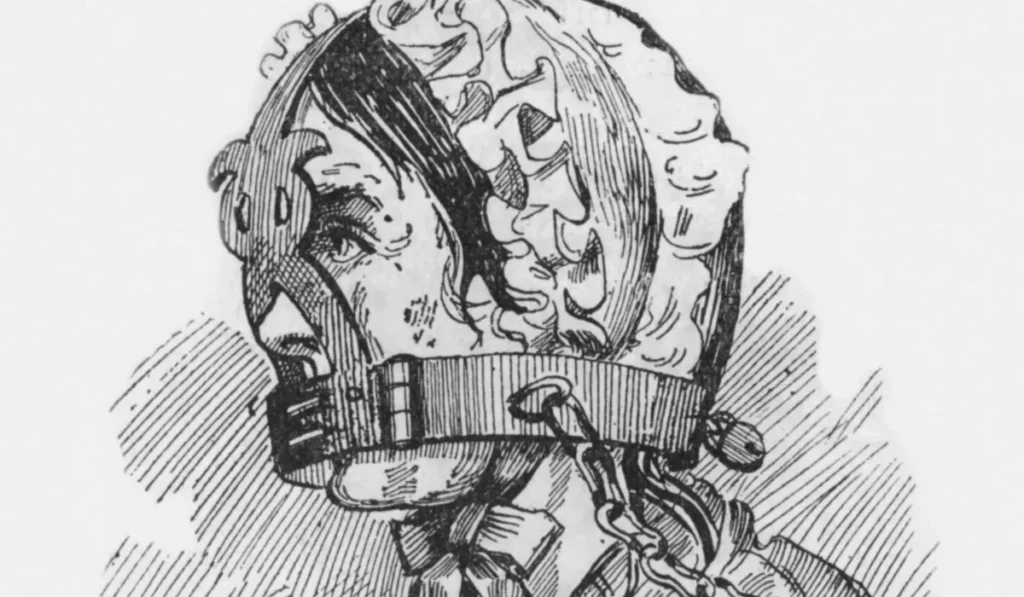Silence and inaction are the torments at the heart of ‘Bridling’, a short story that’s now a riveting play debuting at the National Arts Festival in Makhanda this week.
The terror of it struck me instantly. Only for a moment, but as the stage lights came up and we witnessed actor Buhle Ngaba on a chair placed on top of a table, facing the audience, her face trapped inside that mask-like contraption, the sense of physical and psychological torment was all too real.
My whole body felt it, in fact: the terror of her entrapment causing a kind of constriction, claustrophobia, and panic.
Seeing it worn instantly propelled my imagination into the realm of horror, of subjugation, of control, censorship, authoritarian tyranny. It’s something akin to that terrible mask used to restrain the captured cannibal, Hannibal Lecter, in Silence of the Lambs, and not at all unlike masks used for silencing women in the television serialisation of The Handmaid’s Tale.

The scold’s bridle, also known as a witch’s bridle or gossip’s bridle, was a regular instrument of torture, subjugation and restraint used on women in Europe in the 16th and 17th centuries
These things – known as a scold’s bridle – are very real, though, displayed in museums around the world, including a number of them dedicated to showcasing instruments of mediaeval torture.
I felt that visceral response to the contraption again when Ngaba removed the hideous thing from her face and began her calm, methodical description of how it functions, its constituent parts including a metal bit that would have been placed inside the wearer’s mouth, and its usage as a device for punishing women judged to be too rowdy, outspoken, rambunctious, or simply too gossipy. It was an object not only of humiliation but made to tame and temper its wearer, silence them by making speech impossible.
Plus, of course, there was the obvious shame of having this heavy metal object placed like a cage around one’s head and face.
It seems untenable that such a device would even exist in any civilised reality. And yet these contraptions were once legion, and in fact existed in a dizzying assortment of designs, configurations and degrees of horror.
Despite the shock of that initial image of Ngaba caged and silenced, there was a gentleness that followed, assurance from her that she was not in fact gagged, that the scold’s bridle she’d had on was a prop.
In fact, rather than Ngaba’s character having a bit in her mouth so that she cannot speak, she is the play’s narrator. It is essentially her story, a monologue that is a coming-to-life of Nadia Davids’ award-winning short story, Bridling, about a young, early-in-her-career actress (it could, in some alternate reality, be Ngaba herself) who auditions for a role in a new performance devised by some hot-shot theatre director with a penchant for creating work that is disturbing and challenging.
In this case, his conceptual piece – the play within the play – is something akin to non-theatre, a work of performance art that will require its cast of 12 (as in the number of disciples who followed Christ around) female performers to enact three-dimensional living facsimiles of notable artworks. Each of the paintings selected for such enactment is of a woman and each is by a male artist.
Each of the paintings also alludes in some way to a questionable male gaze. Whether it’s because the woman being depicted is nude or scantily clad, or has been subjected to some sort of violence, what’s evoked is a sense of their having been objectified, victimised, brutalised, captured, trapped or imprisoned by the picture’s frame – and, presumably, by the artist responsible.
In Bridling, as much as we follow the Narrator’s story, we are also witness to a case study of men whose authority resides in their genius. Specifically, artistic genius. It’s represented here by the hypnotic dancer and actor Shaun Oelf, who plays a kind of ethereal representation of the rock-star theatre director whose artistic genius grants him some sort of presumed permission to exercise control and power over the women in his cast, effectively his harem of performers.
From their nerves and anxiety leading up to their audition for him, through to the last emotionally-shattering straw of the show they’re cast in and for which they’re asked to give up their autonomy, we witness a complex power game play out, hearing the consequences – emotional, psychological and metaphysical – for the women involved from Ngaba’s Narrator.
There are physical consequences, too.
Keep reading on Cachet.
More information about FEC funded works.

